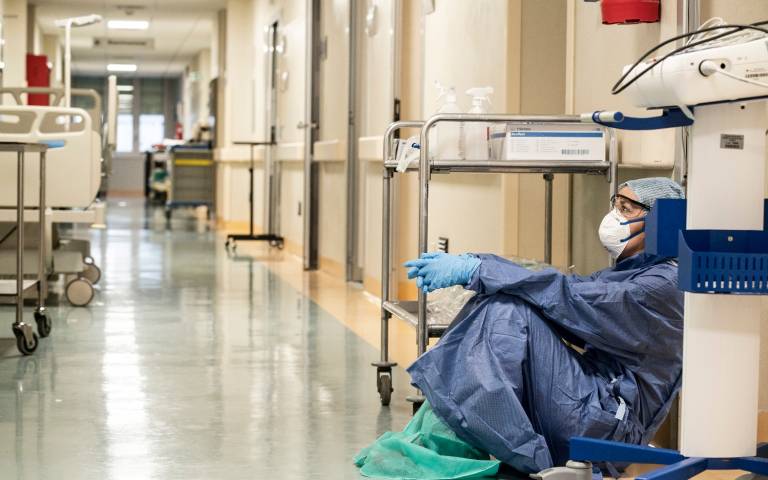Mental health of intensive care staff should be immediate priority
22 January 2021
Nearly half of Intensive Care Unit (ICU) staff are likely to meet the threshold for PTSD, severe anxiety or problem drinking during the COVID-19 pandemic, according to a new study led by UCL and King’s College London researchers.

The study, published in Occupational Medicine, shows the stark impact of working in critical care during the COVID-10 pandemic. The researchers found poor mental health was common in many ICU clinicians although they were more pronounced in nurses than in doctors or other healthcare professionals.
Professor Kevin Fong (UCL STEaPP), a UCLH consultant and National Clinical Advisor with NHS England’s Emergency Preparedness Resilience and Response team for Covid-19, who was a senior author on the paper, said: “This collaboration between KCL Institute of Psychiatry and UCL’s STEaPP has proved to be a genuinely important piece work. Coping with Covid has come at enormous cost to our frontline NHS staff. I have visited intensive care units up and down the country, and spent time working with my own teams at UCLH. Covid is like nothing we’ve ever seen before and has seen us stretch ourselves to the very limits of what can be done.
“The effort had been nothing short of remarkable but we need to think carefully about how we protect our staff now and rest and recover them in the aftermath.”
Seven hundred and nine healthcare workers, from nine ICUs in England, completed anonymous web-based surveys in June and July 2020 comprising 291 (41 per cent) doctors, 344 (49 per cent) nurses, and 74 (10 per cent) other healthcare staff.
Over half (59 per cent) reported good wellbeing, however 45 per cent met the threshold for probable clinical significance for at least one of: severe depression (6 per cent), PTSD (40 per cent), severe anxiety (11 per cent) or problem drinking (7 per cent). Worryingly more than one in eight respondents (13 per cent) reported frequent thoughts of being better off dead, or of hurting themselves in the past two weeks.
Lead author, Professor Neil Greenberg, from the Institute of Psychiatry, Psychology & Neuroscience (IoPPN), King’s College London said: “Our results show a substantial burden of mental health symptoms being reported by ICU staff towards the end of the first wave in July and July 2020. The severity of symptoms we identified are highly likely to impair some ICU staff’s ability to provide high quality care as well as negatively impacting on their quality of life.
“The high rate of mortality amongst COVID-19 patients admitted to ICU, coupled with difficulty in communication and providing adequate end-of-life support to patients, and their next of kin because of visiting restrictions, are very likely to have been highly challenging stressors for all staff working in ICUs.
Professor Greenberg added: “Whilst these results are in some ways not surprising, they should serve as a stark reminder to NHS managers of the pressing need to protect the mental health of ICU workers now in order to ensure they can deliver vital care to those in need.”
ICU staff have faced a particularly challenging time frequently working in areas where the perceived risk of COVID-19 exposure is high for long periods, wearing PPE, with the challenges of managing staff and equipment shortages on a daily basis especially during the first wave. They have also had to deal with ethically challenging decisions as well as potentially being fearful of catching COVID-19 themselves and potentially passing it on to their loved ones.
Professor Greenberg said: “Evidence-based mechanisms should be in place so all healthcare workers, including ICU staff, can promptly access treatment for mental health issues. If we protect the mental health of healthcare workers during the COVID-19 pandemic, staff will be better able to sustainably deliver high quality care to the large numbers of patients seriously unwell with COVID-19.’
Further work is needed to better understand the real level of clinical need amongst ICU staff as self-report questionnaires can overestimate the rate of clinically relevant mental health symptoms.
Professor Greenberg concluded: ‘Our results highlight the potential profound impact that COVID-19 has had on the mental health of frontline UK staff and indicate an urgent need for a national strategy to protect staff mental health and decrease the risk of functional impairment of ICU staff while they carry out their essential work during COVID-19 and beyond.”
This research included important contributions from Public Health England (the Emergency Response Department Science & Technology’s Behavioural Science team) and the University of Oxford.
The work was funded by the National Institute for Health Research Health Protection Research Unit (NIHR HPRU) in Emergency Preparedness and Response at King’s College London in partnership with Public Health England (PHE), in collaboration with the University of East Anglia and Newcastle University.
Links
- Full paper in Occupational Medicine
- Professor Kevin Fong’s academic profile
- UCL STEaPP
- UCL Engineering Sciences
- KCL Institute of Psychiatry, Psychology & Neuroscience
- UCLH
Image
San Salvatore Hospital in Pesaro, Italy, on 19 March 2020. Credit: Alberto Giuliani. Source: Wikimedia Commons.
Media contact
Mark Greaves
m.greaves [at] ucl.ac.uk
 Close
Close

